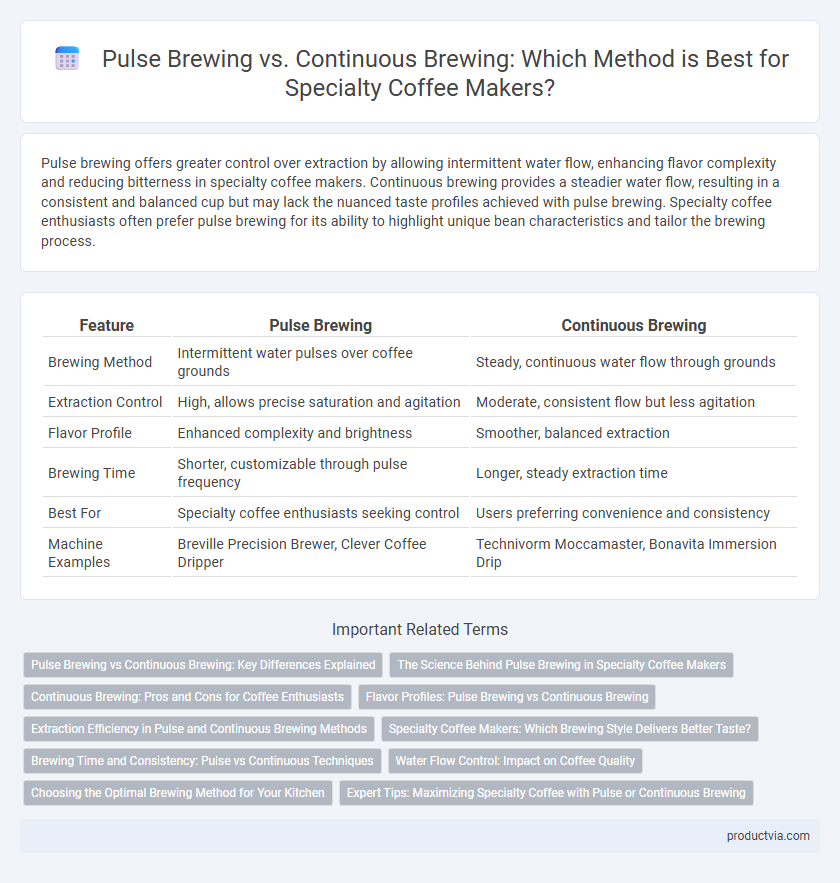Pulse brewing offers greater control over extraction by allowing intermittent water flow, enhancing flavor complexity and reducing bitterness in specialty coffee makers. Continuous brewing provides a steadier water flow, resulting in a consistent and balanced cup but may lack the nuanced taste profiles achieved with pulse brewing. Specialty coffee enthusiasts often prefer pulse brewing for its ability to highlight unique bean characteristics and tailor the brewing process.
Table of Comparison
| Feature | Pulse Brewing | Continuous Brewing |
|---|---|---|
| Brewing Method | Intermittent water pulses over coffee grounds | Steady, continuous water flow through grounds |
| Extraction Control | High, allows precise saturation and agitation | Moderate, consistent flow but less agitation |
| Flavor Profile | Enhanced complexity and brightness | Smoother, balanced extraction |
| Brewing Time | Shorter, customizable through pulse frequency | Longer, steady extraction time |
| Best For | Specialty coffee enthusiasts seeking control | Users preferring convenience and consistency |
| Machine Examples | Breville Precision Brewer, Clever Coffee Dripper | Technivorm Moccamaster, Bonavita Immersion Drip |
Pulse Brewing vs Continuous Brewing: Key Differences Explained
Pulse brewing in specialty coffee makers involves intermittent water flow that allows better extraction control, producing richer flavor profiles and enhanced aroma. Continuous brewing maintains a steady water stream, resulting in consistent extraction but may risk over-extraction or bitterness with delicate beans. Specialty coffee enthusiasts often prefer pulse brewing for its precision and ability to highlight complex flavor notes in high-quality coffee.
The Science Behind Pulse Brewing in Specialty Coffee Makers
Pulse brewing in specialty coffee makers mimics manual pour-over techniques by intermittently adding water, promoting even coffee extraction and enhancing flavor complexity. This method allows better control over saturation and agitation, reducing channeling and increasing the solubility of desirable compounds like chlorogenic acids and lipids. Studies show pulse brewing improves particle-water interaction, leading to a balanced brew with optimized aroma and acidity compared to continuous brewing.
Continuous Brewing: Pros and Cons for Coffee Enthusiasts
Continuous brewing maintains a consistent water flow and temperature, ensuring even extraction and balanced flavor in specialty coffee. This method reduces bitterness and highlights coffee's nuanced aroma by allowing precise control over brewing variables. However, continuous brewing machines can be more expensive and complex to operate, requiring regular maintenance to preserve optimal performance.
Flavor Profiles: Pulse Brewing vs Continuous Brewing
Pulse brewing enhances extraction by intermittently stopping the water flow, allowing coffee grounds to release complex flavor compounds, resulting in brighter acidity and nuanced floral or fruity notes. Continuous brewing maintains a steady water flow, producing a more uniform extraction that emphasizes balanced body and consistent taste but may under-extract subtle aromatic elements. Specialty coffee makers often prefer pulse brewing to highlight distinctive origin flavors and maximize the coffee's unique profile.
Extraction Efficiency in Pulse and Continuous Brewing Methods
Pulse brewing enhances extraction efficiency by allowing intermittent water flow, which promotes better saturation and agitation of coffee grounds, resulting in more uniform flavor extraction. Continuous brewing maintains steady water flow, ensuring consistent extraction but may lead to under- or over-extraction in some regions of the grounds. Specialty coffee makers often prefer pulse brewing for its ability to optimize extraction balance, reduce channeling, and highlight nuanced coffee flavors.
Specialty Coffee Makers: Which Brewing Style Delivers Better Taste?
Pulse brewing enhances extraction by intermittently agitating coffee grounds, optimizing flavor complexity and acidity in specialty coffee makers. Continuous brewing maintains a steady water flow, promoting consistent extraction but may result in a less dynamic taste profile. Specialty coffee enthusiasts often prefer pulse brewing for its ability to highlight nuanced flavor notes and balance in high-quality beans.
Brewing Time and Consistency: Pulse vs Continuous Techniques
Pulse brewing in specialty coffee makers involves intermittent water flow, offering precise control over extraction time and enhancing flavor clarity, often resulting in shorter brewing durations. Continuous brewing maintains a steady water stream, promoting uniform saturation and consistent extraction, which is ideal for maintaining repeatable cup quality despite slightly longer brew times. Specialty coffee enthusiasts prioritize pulse brewing for nuanced flavor development, while continuous brewing ensures stability and reliability in everyday use.
Water Flow Control: Impact on Coffee Quality
Pulse brewing delivers water in controlled bursts, allowing grounds to bloom fully and enhancing flavor extraction by preventing over-extraction and bitterness. Continuous brewing maintains a steady water flow, producing a consistent but sometimes less nuanced cup due to uniform saturation. Speciality coffee makers with pulse flow control optimize water contact time, improving aroma complexity and balanced taste profiles.
Choosing the Optimal Brewing Method for Your Kitchen
Pulse brewing alternates water flow in intervals, enhancing extraction by allowing coffee grounds to bloom and release more flavor, ideal for highlighting complex notes in specialty coffee. Continuous brewing maintains a steady water flow, producing a consistent and balanced cup, preferred for simplicity and speed. Choosing the optimal brewing method depends on flavor preference and brewing time, with pulse brewing suited for those seeking nuanced taste profiles and continuous brewing favored for routine convenience.
Expert Tips: Maximizing Specialty Coffee with Pulse or Continuous Brewing
Pulse brewing enhances extraction by intermittently agitating coffee grounds, allowing more control over flavor clarity and acidity in specialty coffee. Continuous brewing maintains a steady water flow, promoting uniform extraction and consistent strength ideal for balanced profiles. Experts recommend experimenting with pulse settings to accentuate unique bean characteristics, while continuous brewing suits those seeking smooth, full-bodied cups.
Pulse brewing vs Continuous brewing for specialty coffee makers Infographic

 productvia.com
productvia.com